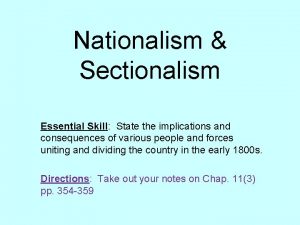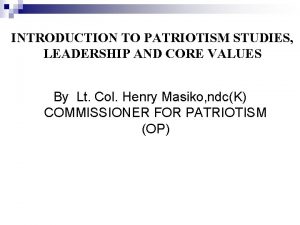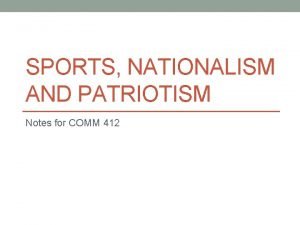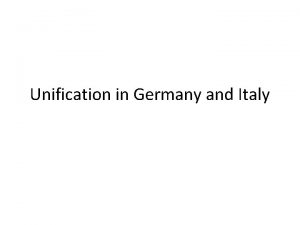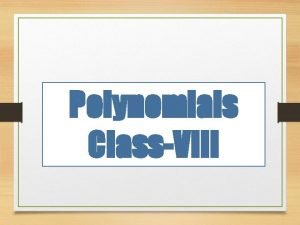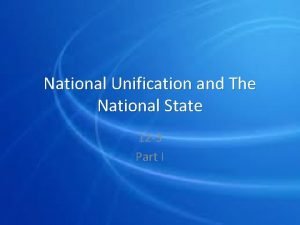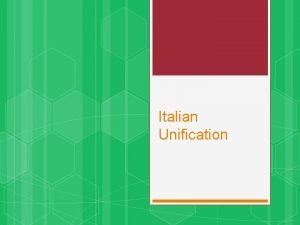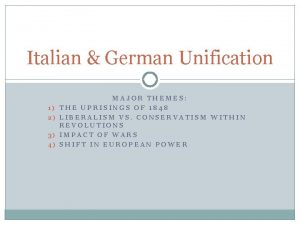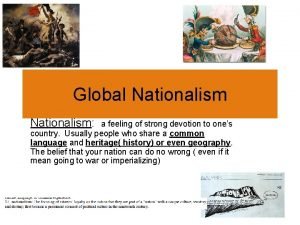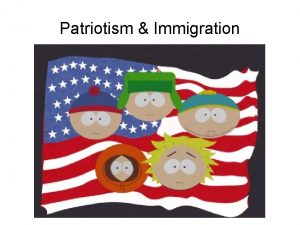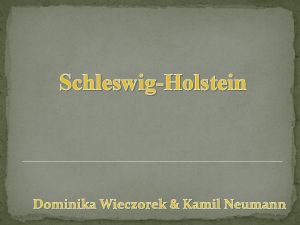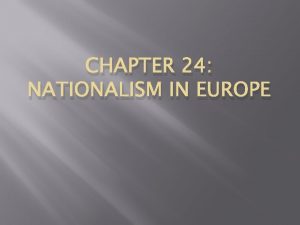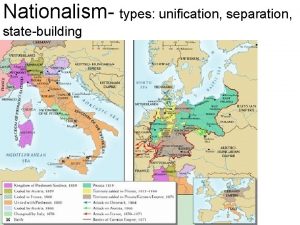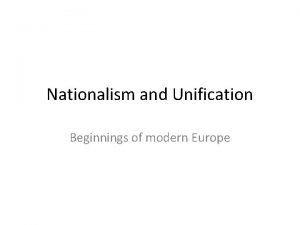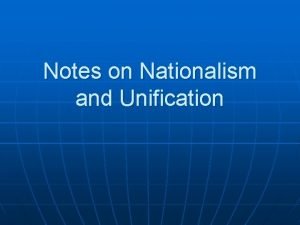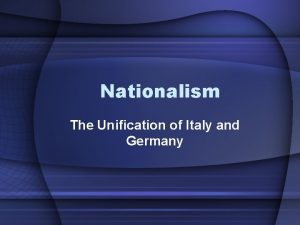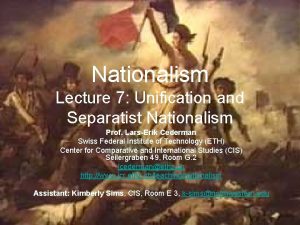Key Terms Nationalism and Unification Nationalism SchleswigHolstein Patriotism















- Slides: 15

Key Terms – Nationalism and Unification Nationalism Schleswig-Holstein Patriotism Austro-Prussian War Propaganda Confederation of the Rhine North German Confederation Franco-Prussian War Zollverein Ems Telegram Blood and Iron Treaty of Frankfurt Wilhelm I Kaiser Otto von Bismarck Bundesrat Reichstag

Nationalism v. Patriotism Nationalism → extreme pride in one's country. People believed that supporting their country through times of crisis made it easier for them to survive the crisis themselves. Patriotism → love of one's country. Patriotic people feel it is their duty to repay their country for what has been provided to them. Claim that their patriotism allows them to question the motives of their countries.

Ways to Inspire Both When countries face times of crisis, they attempt to rally the support of their citizens through propaganda. Propaganda → form of communication aimed at influencing the attitude of a community towards a specific position. Propaganda involves the use of posters, slogans and other forms of media to change public opinion.

More Propaganda

German Unification Prior to 1848, Germany was broken up into 38 states ruled mostly by princes or kings. 16 of these states unified to become the Confederation of the Rhine. The ties between the states were loose at best and had no centralized government

Confederation of the Rhine (cont. ) The Confederation of the Rhine was only held together by a taxation union known as the Zollverein. Frederick William IV was offered the opportunity to rule over a unified Germany but refused on the basis that it would dissolve his absolute rule.

The Blood and Iron Movement A vision of a unified Prussia would come from the rule of Wilhelm I. Otto von Bismarck, selected as chief minister by Wilhelm I offered an idea to unify Germany known as the Blood and Iron Movement. The states would be unified by the blood of their enemies and the iron of their swords; in other words, unification via war.

Obstacles to Unification There were many obstacles standing in the way of German unification. The Austrians and the French opposed unification because they did not want to see a strong German country established in the center of Europe. The German princes opposed unification because they did not want to give up their power to a national government.

Schleswig-Holstein 1864, Danish forces would take over an area known as Schleswig. Prussians and Austrians objected to the Danish occupation of the territory. Would attack the Danish forces and win the territories of Schleswig and Holstein from the Danes. Prussians would acquire Schelswig and the Austrians would acquire Holstein.

Austro-Prussian War fought in 1866, also known as the Seven Weeks' War. France and Russia were convinced by Bismarck to stay out of the war to ease the defeat of Austria would be defeated easily and would cede control of Holstein to the Prussians.

North German Confederation To consolidate Prussian power, Bismarck constructed the North German Confederation → union of many northern German states under the rule of Prussia. Southern Germans did not want to join for two reasons: Religious difference Fear of French intervention.

The Two House Legislature Bundesrat Upper house Members were appointed by the kaiser and chancellor Were mostly people that were sympathetic to the positions of the kaiser and chancellor Reichstag Lower house Members were elected Governed by a chief officer (Bismarck at the time)

Road to War Bismarck wanted to use French nationalism as a weapon against the French themselves. He used the selection of the next Spanish king as a means of stirring up warfare. Bismarck convinced the French, through manipulation of the Ems Telegram (a letter sent to Bismarck from King William I stating a Prussian prince would not be selected), that they had been insulted by the Spanish. Once this exchange was made public, war was demanded by the French and Prussians.

Franco-Prussian War started in July 1870. Southern German states assisted the North German Confederation. The Germans would defeat a Napoleon III led army. Would take Napoleon III prisoner and march on Paris → in 1871, Paris surrendered.

Unification Treaty of Frankfurt → ended the Franco. Prussian War and ceded Alsace and Lorraine to Germany. Bismarck would meet with all of the German leaders at the Palace of Versailles. German Empire would be constructed at this meeting and Wilhelm I would become the first kaiser (emperor) of Germany.
 Patriotism vs nationalism venn diagram
Patriotism vs nationalism venn diagram Chapter 23 lesson 3 nationalism unification and reform
Chapter 23 lesson 3 nationalism unification and reform Patriotism and education are traditional american values.
Patriotism and education are traditional american values. Plain folks propaganda meaning
Plain folks propaganda meaning Unscramble thesis
Unscramble thesis Patriotism as a core value
Patriotism as a core value Patriotism notes
Patriotism notes German and italian unification compare and contrast
German and italian unification compare and contrast Polynomial classification
Polynomial classification Identify the terms and like terms in the expression. t+8+3t
Identify the terms and like terms in the expression. t+8+3t National unification and the national state
National unification and the national state Unification prolog
Unification prolog Italian unification summary
Italian unification summary What was the most serious obstacle to german unification?
What was the most serious obstacle to german unification? Love my country
Love my country Strong devotion
Strong devotion
